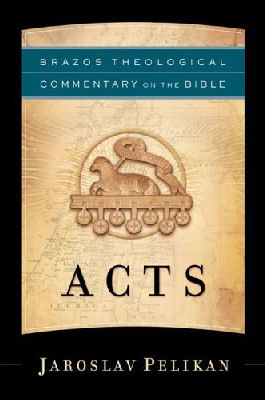
|
Posted May 18, 2006
Book: Acts Author: Jaroslav Pelikan Brozos Press, Grand Rapids, MI. 2005. Pp. 320 An Excerpt from the Introduction: "Moses
Acts is a book of frenetic action amid a constantly shifting scene: conspiracy and intrigue and ambush, hostile confrontations and fierce conflicts sometimes to the death, rioting lynch mobs and personal violence, "journeyings often" and incessant travel on an Odysseus-like scale all over the Mediterranean world, complete with shipwreck and venomous serpents, "chains and imprisonment", followed in at least two instances by a successful jailbreak, though only with the aid of celestial mechanics, famine and earthquake, crime and punishment (as well as a great deal of punishment, sometimes even capital punishment without any real crime ever having been committed.) Gerhard A. Krodel quotes the eloquent description of the book by Edgar Johnson Goodspeed: Where, within eighty pages, will be found such a varied series of exciting events - trials, riots, persecutions, escapes, martyrdoms, voyages, shipwrecks, rescues - set in that amazing panorama of the ancient world - Jerusalem, Antioch, Philippi, Corinth, Athens, Ephesus, Rome? And with such scenery and settings - temples, courts, prisons, deserts, ships, barracks, theaters? Has any opera such variety? A bewildering range of scenes and actions (and of speeches) passes before the eye of the historian. And in all of them he sees the providential hand that has made and guided ths great movement for the salvation of mankind. An Excerpt from the Book: The Divine Gift of Friendship Acts 27:3 The centurion, being kindly disposed to Paul, permitted his friends to come to him and take care of him. Two of the most influential of the philosophical treatises of Cicero (See our website on Cicero's De Officiis [On Duty] and De amicitia (On Friendship). But while Saint Ambrose composed a treatise entitled De officiis ministrorum, [the duties of ministries] which adapted the categories and even the outline of Cicero's work while emphasizing the sharp contrast between Stoic and Christian morality, he did not write one called De amicitia christiana [Christian friendship] though he well could have, for the idea of the divine gift of Christian friendship plays a prominent enough role throughout the Bible, including Acts, to warrant such a special treatise unto itself. From the portrait of him in Acts as well as from his own epistles it is clear that as Saint Paul was prone to sudden and violent outbursts of anger "God shall strike you, you whitewashed wall!" He could shout at the high priest, and he could write to his congregation, "O foolish Galatians! Who has bewitched you?" - so he was capable both of expressing and of evoking deep and loyal friendship. This is nevertheless one of only two passages in Acts where the actual word "friend" is used in connection with him. But because, to paraphrase the proverb, a friend is as a friend does, the theme of friendship, like the other "religious affections" that are portrayed here, comes through in the narratives of Acts primarily in concrete acts of friendship, from which it is possible to read off some of its characteristics: 1. Friendship is demonstrative, as Paul's friends at Tyre manifested it to him and to his traveling companions, who evidently, from the use of the pronoun "we", included the author of Acts: "And when our days there were ended, we departed and went on our journey; and they all, with wives and children, brought us on our way till we were outside the city; and kneeling down onthe beach we prayed and bade one another farewell." The contrast could not be greater between this effusive demonstration character of Christian friendship in the apostolic church was the "holy kiss", to which Paul often refers at or near the conclusion of an epistle; this has continued in the liturgy of many churches as "the kiss of peace," but in some cultures it is often the standard expression of Christian friendship also outside the liturgical context. Table of Contents: Acts 1 to Acts 28 |
|
